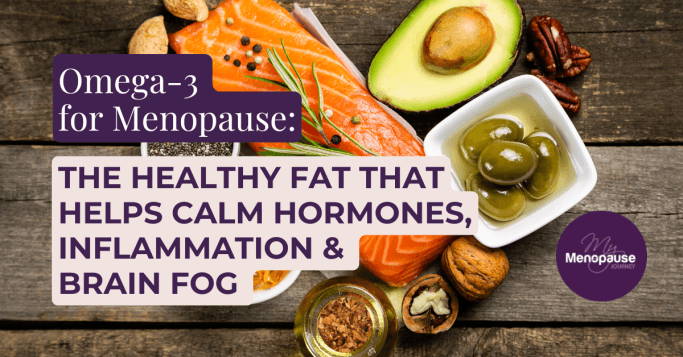Feeling wired-but-tired, moody, or just not quite yourself lately? I’ve been there.
Magnesium wasn’t the one answer to my menopause rollercoaster (there are always many pieces to the puzzle), but once I started replenishing it, I noticed some surprisingly big shifts. I slept more deeply. The cramps and restless legs that used to drive me crazy at night? Gone. My body just felt steadier, calmer — like it finally had a little backup.
Because the truth is… a lot of magnesium benefits for menopause are often overlooked.
And low levels can leave you feeling off in more ways than one! That could be poor sleep, aching muscles, anxious thoughts, digestive issues and even stubborn weight gain.
That’s why magnesium for menopause deserves way more credit than it gets. Let’s take a closer look at the magnesium benefits that can make midlife feel a whole lot more manageable.
Magnesium Benefits for Menopause
Magnesium plays a key role in midlife wellness. Some of the top magnesium benefits for menopause include:
- Supporting hormones like estrogen, progesterone, thyroid and DHEA
- Calming the stress response and reducing anxiety
- Improving sleep quality and easing restless legs
- Boosting metabolism and energy production
- Lifting mood and balancing emotional swings
- Strengthening bones by activating vitamin D and calcium
- Protecting heart health and steadying blood pressure
- Stabilizing blood sugar and curbing cravings
- Relieving bloating, puffiness and digestive issues
- Supporting skin health, collagen and natural detox
Adding more magnesium for menopause through foods, supplements or lifestyle habits can help ease many common symptoms and support long-term health.


- Magnesium Benefits for Menopause
- 1. Helps Rebuild Your Hormonal Foundation
- 2. Tames the Stress Spiral
- 3. Revs Up a Sluggish Metabolism
- 4. Lifts Mood and Eases Emotional Swings
- 5. Supports Deep, Restorative Sleep
- 6. Strengthens Your Bones from Within
- 7. Keeps Your Heart Steady and Blood Pressure Balanced
- 8. Helps Stabilize Blood Sugar and Cut Cravings
- 9. Soothes Bloating, Gas, and Puffiness
- 10. Gives Skin a Glow and Supports Detox
- TIP #1: Eat Magnesium-Rich, Whole Foods
- TIP #2: Stop Draining Your Magnesium Stores
- TIP #3: Choose the Right Magnesium Supplement
- TIP #4: Try Topical Magnesium and Mineral Baths
- TIP #5: Keep Your Movement Gentle and Nourishing
- TIP #6: Repair the Gut, Absorb More!
- What are the symptoms of low magnesium in menopause?
- Which magnesium is best for menopause?
- How can I get more magnesium naturally?
- Does magnesium really help with sleep in menopause?
Why Midlife Women Often Run Low on Magnesium
Magnesium is already hard to get from food, and hormonal changes in menopause can add even more challenges.
Here’s why magnesium levels drop often drop:
- Stress and high cortisol flush it out
- Gut health affects how well you absorb it
- Sugar, caffeine and processed food deplete it
- Low stomach acid (so absorption gets worse)
Some medications (like diuretics, PPIs and certain antibiotics) waste it
You might not notice at first — but over time, small imbalances start to show up in big ways!
What Magnesium Does for You in Menopause
Many think it’s “just another mineral”… but here’s showing what magnesium benefits for menopause deserve to be part of your daily life!
1. Helps Rebuild Your Hormonal Foundation
Magnesium supports the production of estrogen, progesterone, thyroid hormones and DHEA — the very hormones that take a nosedive in menopause.
When those are low, magnesium steps in to soften the hormonal landing!
2. Tames the Stress Spiral
Your adrenal glands need magnesium to function properly.
Without it, cortisol stays high, anxiety builds and your nervous system feels stuck in overdrive. Replenishing magnesium gives your body the signal to exhale!
3. Revs Up a Sluggish Metabolism
Midlife metabolism is tricky, but magnesium plays a key role in how your cells create and use energy.
When it’s low, you might feel tired, foggy or just “slow.” Getting enough magnesium can help your body burn fuel more efficiently!
4. Lifts Mood and Eases Emotional Swings
Magnesium helps your brain make serotonin and GABA — the “feel-good” and “calm down” chemicals. If your moods are swinging, or you’re more anxious than usual, magnesium might be the steady hand your brain is asking for!
5. Supports Deep, Restorative Sleep
Sleep is one of the first things to go haywire in menopause. Good thing magnesium calms the nervous system and helps your body make melatonin — your sleep hormone. No more lying awake at 3 a.m. replaying every conversation you had in 1997!
6. Strengthens Your Bones from Within
Bone health isn’t just calcium. Magnesium is your mega helper in activating vitamin D, which helps your bones absorb calcium properly.
Keep in mind that in menopause, as estrogen starts to decline, bone loss also speeds up. That’s because we also lose estrogen’s natural protective properties. But magnesium can be your new protector!
7. Keeps Your Heart Steady and Blood Pressure Balanced
Magnesium relaxes blood vessels, improves circulation and supports a steady heartbeat. It’s especially important now, as cardiovascular risks increase after menopause.
8. Helps Stabilize Blood Sugar and Cut Cravings
Crashing after meals? Craving sugar constantly?
Magnesium helps insulin do its job and keeps blood sugar more stable — which also helps you avoid the mid-afternoon energy crash!
9. Soothes Bloating, Gas, and Puffiness
A sluggish gut is common in menopause, but magnesium comes to save us by gently stimulating digestion, relieving water retention and reducing inflammation in the midsection!
10. Gives Skin a Glow and Supports Detox
Magnesium boosts glutathione (your body’s master antioxidant) and supports collagen production. This helps with everything from cellular repair to clearer skin — and supports your body’s natural detox process!
6 Tips to Get More Magnesium Without Overthinking It!
TIP #1: Eat Magnesium-Rich, Whole Foods
- Leafy greens (spinach, chard, arugula)
- Broccoli, seaweed, cabbage
- Pumpkin seeds, chia, almonds, cashews
- Avocados
- Buckwheat, quinoa
- Dark chocolate
- Sardines, wild salmon and mackerel
Sprinkle seeds on your salads, blend nuts into smoothies, and try a few new magnesium-rich veggies each week!
TIP #2: Stop Draining Your Magnesium Stores
Many lifestyle factors flush magnesium out of your system faster than you can rebuild it:
- Chronic stress and cortisol
- Refined sugar, processed carbs and soda
- Alcohol and excessive caffeine
- Tap water (fluoride and chlorine interfere with absorption)
Go for filtered water, avoid processed foods and make room for more calm in your day — even just a few deep breaths help!
TIP #3: Choose the Right Magnesium Supplement
Not all forms are equal. Here’s a quick cheat sheet for you:
Magnesium glycinate – great for easing anxiety, promoting relaxation, giving you better sleep and curbing cravings
Magnesium citrate – good for digestion and constipation
Magnesium malate – helps with fatigue and muscle soreness
Avoid magnesium oxide — it’s poorly absorbed and often causes stomach upset!
TIP #4: Try Topical Magnesium and Mineral Baths
Magnesium oil (rubbed on feet, shoulders or belly) works well — especially if your gut isn’t absorbing supplements.
Epsom salt baths or foot soaks are a soothing way to get magnesium in through your skin.
TIP #5: Keep Your Movement Gentle and Nourishing
Overexercising can deplete magnesium fast. Try more gentle movements such as:
- Yoga
- Qigong or Tai Chi
- Walking or rebounding
- Light strength training
The goal is to support your body — not stress it further!
TIP #6: Repair the Gut, Absorb More!
- Magnesium needs a healthy gut to get where it’s going. Support yours with:
- Fermented foods (sauerkraut, kefir, kimchi)
- Prebiotic-rich veggies
- Plenty of fiber and hydration
If you suspect gut issues, focus on healing before loading up on supplements.
What you absorb matters more than what you swallow!
Final Thought: Magnesium Might Be Small, But Its Impact Isn’t
Now you know the top magnesium benefits for menopause!
This isn’t a magic fix though — but a foundational shift.
Magnesium is one of those minerals that doesn’t get headlines, but when it’s low, many corners in your body tend to struggle!
If your body is giving you signals — tight muscles, poor sleep, cravings, mood swings — it might be asking for this quiet, essential support.
Start where you are! Try one or two of the tips above and notice how you feel.
Sometimes, feeling better starts with one small step you didn’t even know you were missing!
FAQ: Magnesium Benefits for Menopause
What are the symptoms of low magnesium in menopause?
Low magnesium can sneak up as restless legs, cramps, poor sleep, sugar cravings, anxiety, mood swings, or even stubborn weight gain. Many women think these are “just hormones,” but magnesium plays a big role too.
Which magnesium is best for menopause?
It depends on what your body needs most: magnesium glycinate is calming and supports sleep and mood, magnesium citrate helps digestion, and magnesium malate can ease fatigue and sore muscles. I usually suggest skipping magnesium oxide — it’s poorly absorbed and can upset your stomach.
How can I get more magnesium naturally?
Leafy greens, seeds, nuts, avocado, dark chocolate, and fatty fish are all rich in magnesium. You can also try topical magnesium (like oils or Epsom salt baths) and choose a well-absorbed supplement if needed.
Does magnesium really help with sleep in menopause?
Yes! Magnesium helps your body make melatonin (your sleep hormone) and calms your nervous system. For me, it was the missing piece for restless legs and those 3 a.m. “wide awake” nights.
References:
ncbi.nlm.nih.gov/pubmed/28392498
openheart.bmj.com/content/5/1/e000668
ncbi.nlm.nih.gov/books/NBK225636/
ods.od.nih.gov/factsheets/Magnesium-Consumer/
ncbi.nlm.nih.gov/pubmed/20152124
ncbi.nlm.nih.gov/pmc/articles/PMC4455825/
ncbi.nlm.nih.gov/pmc/articles/PMC3085555/
ncbi.nlm.nih.gov/pmc/articles/PMC4586582/
journals.plos.org/plosone/article?id=10.1371/journal.pone.0180067


Gita is the founder of My Menopause Journey. Since 2014, she has been supporting midlife women by sharing hard-earned learnings from her own experience. To advance her knowledge, Gita puts a lot of her time and effort into understanding the broad spectrum of women’s health. She immerses in extensive research about the physical, mental and emotional aspects of menopause. Gita believes in the life-changing power of healthy, holistic living — this is where she anchors her message to all women. Learn more about her marvelous mission in About us - My Menopause Journey.





